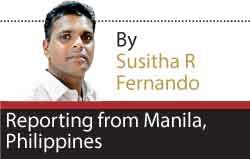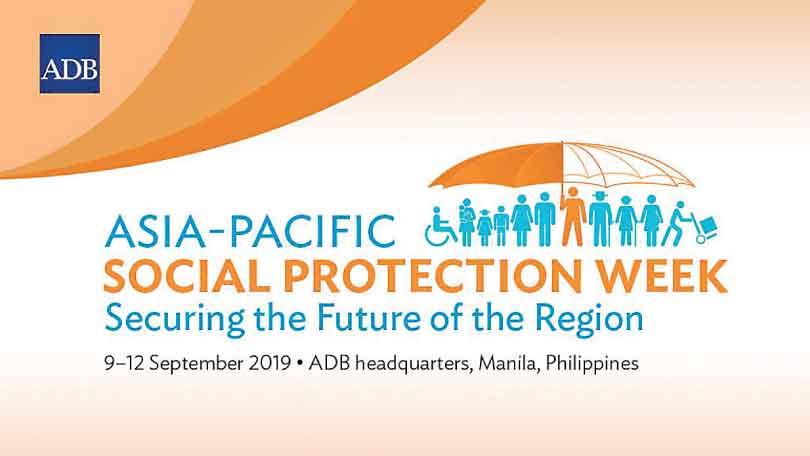Reply To:
Name - Reply Comment

 A top official of the Asian Development Bank (ADB) revealed that middle-income and lower middle-income member countries in Asia-Pacific region, which included Sri Lanka, will need to open up new fiscal space to meet minimum requirements for social protection funding.
A top official of the Asian Development Bank (ADB) revealed that middle-income and lower middle-income member countries in Asia-Pacific region, which included Sri Lanka, will need to open up new fiscal space to meet minimum requirements for social protection funding.
Referring to a study conducted by ADB, Bambang Susantono ADB Vice President for Knowledge Management and Sustainable Development said this, opening the Social Protection Week 2019 under the theme “securing the future of the region” at the ADB headquarters in Manila, Philippines. The event was organised by the ADB together with 14 partner international organizations including International Labour Organisation (ILO), Food and Agriculture Organization (FAO), GIZ, HelpAge, International Policy Center for Inclusive Growth, UNAIDS, ESCAP, World Bank
“An ADB study conducted in 16 developing member countries found that upper middle-income countries such as Malaysia, the People’s Republic of China, Thailand, and Vietnam should be able to meet the social protection agenda within the limit of their current fiscal deficit”.
“Other middle income countries will need to open up new fiscal space to meet minimum requirements for social protection funding,” said Bambang Susantono, ADB Vice President warning that lower middle-income countries such as Timor-Leste will have to make trade-offs among different social protection investments, given their fiscal constraints.
He also said that potential sources of revenue mobilization for these countries include improving tax collection, re-allocating energy subsidies and employing natural resource taxes.
“Governments, civil society, and other development partners need to immediately start long-term fiscal and financial planning for implementing the social protection agenda. Countries should also create national policy dialogues for designing national social protection systems, conduct budget and revenue reviews and support capacity-building for social protection planning, administration, and implementation,” Mr. Susantono stressed.
Around 300 social protection experts and advocates from governments (including Sri Lanka), development agencies, academia, media, and the civil society and representatives from the ADB Sri Lanka are participating at the on-going event which has 26 extensive sessions on major issues faced by countries in the Asia-pacific region. Some of the key topics that are being discussed at the event are social assistance, sustainable financing, pension reforms, aging and long-term care, climate change and disaster resilience, gender dimensions in social protection, youth and employment, disability inclusion, use of digital technology for service delivery and roles of government leaders and development agencies.

Representing Sri Lanka’s government institutions Ananda Wimalaweera, Commissioner General of Labour, Department of Labour and Jagath Dharmapriya Dias, Director General, Department of Pensions, Ministry of Public Administration Management and Law and Order made presentations as panelists while Utsav Kumar, Senior Country Economist, ADB Sri Lanka Resident Mission, made a presentation at the session under the theme ‘Macro-economic stability of the era of aging population’ with special reference to Sri Lanka, which has a booming aging population compared to many parts of the world.
Among the other Sri Lankan participants were Commissioner of Labour Milanga Weerakkody, N. K. Krishantha, Deputy Director National Secretariat for Elders, Ministry of Primary Industries and Social Empowerment and Savindi Jayakody, Associate Economics Officer, Sri Lanka Resident Mission.
Opening the conference, ADB Vice President Susantono stated that in the past decades the region has continued to make tremendous progress in economic and social development and has been remarkably successful in reducing extreme poverty.
Other middle income countries will need to open up new fiscal space to meet minimum requirements for social protection funding,” said Bambang Susantono, ADB Vice President
“Despite this progress, large challenges remain, and new ones are emerging. About 300 million people still live in extreme poverty and over 830 million people live between US$1.90 and US$3.20 a day. Inequalities within and across countries remain high. Large groups of people continue to struggle for adequate income, decent living conditions, and access to health care and essential services,”.
Speaking further, the ADB Vice President also said that more needs to be done to help break inter-generational cycles of poverty, enhance growth through investment in human capital, increase productivity, and reduce vulnerability to risks.
“Last year we released ADB’s Strategy 2030, which has seven operational priorities. The first operational priority is addressing the remaining poverty and reducing inequalities. Investing in human capital development and social protection is key to achieving this”.
Our focus on social protection is aligned with the international Agenda 2030 for Sustainable Development, and its call to leave no one behind. The SDGs recognize the importance of social protection and call upon countries to develop nationally appropriate social protection measures for all, especially the poor and vulnerable.
It is encouraging to see the positive momentum and response in our region. More and more governments, in collaboration with development partners, are placing social protection at the core of their development agenda.
He also noted that ADB’s latest Social Protection Indicator reports, released in July this year has shown that there had been significant progress in expanding social protection across the Asia and Pacific region. Many of ADB’s developing member countries are reforming, strengthening, and expanding social protection policies and programmes to support the poor and vulnerable. Spending on social protection in Asia has increased moderately from 4% to 5.3% of GDP while in the Pacific spending has increased from 4% in 2005 to 6% in 2015.